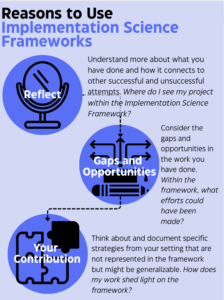[ad_1]
By Cati Brown-Johnson, Sonia Rose Harris & Lisa Goldthwaite
Within the February problem of the Journal, Hofmeyr and colleagues describe a postpartum household planning high quality enchancment initiative in a big public hospital in Botswana. Their initiative aimed to enhance postpartum contraceptive counseling and provision, notably efforts to combine intrauterine machine providers into scientific observe whereas additionally monitoring affected person expertise. Their efforts keep in mind that even with greatest observe suggestions, shifting from proof to observe have to be formed by native contexts and mirror real-life experiences.
In our editorial, we reward the authors for reporting this examine, particularly given the give attention to high quality enchancment and implementation, which might advance the rising subject of implementation science. Whereas high quality enchancment is comparatively easy—enhancing high quality of care – implementation science goes a step additional. Implementation science is the science represented by generalizable information, ideas, frameworks, theories and instruments of implementing interventions in real-world contexts. Implementation science, like high quality enchancment, is all concerning the how. How is that this intervention greatest delivered domestically?
Whereas Hofmeyr et al solely point out ‘implementation’ a handful of instances inside their article, we see ideas all through, which calls into query—what profit can we, as researchers and clinicians, get if we name this high quality enchancment or implementation science? What’s the benefit of utilizing frameworks and theories outlined in implementation science?
Right here’s what we suggest in our editorial:
Mirror: Perceive what you’ve got finished and the way it connects to different profitable and unsuccessful makes an attempt.
Gaps and Alternatives: Think about the gaps and alternatives within the work you’ve got finished. Through the use of an implementation framework, you may see alternatives which are presently not reported on—for instance affected person involvement.
Your Contribution: Take into consideration specifics out of your setting not represented within the framework, this may very well be your contribution to an evolution of the framework.

One other success we be aware—Hofmeyr et al embrace affected person satisfaction as a side of their program evaluation since speaking to individuals may help make sure that modifications are well-suited for the native context. Affected person enter could be gathered at many factors in enchancment work, together with program analysis as we see on this instance. We encourage these doing enchancment work to think about additionally inviting affected person representatives onto mission groups early in mission improvement, with a view to incorporate their constructive insights from the start, thus centering affected person voices all through design and implementation.
From our perspective, whether or not we name it high quality enchancment, implementation science–or one thing else—whether or not affected person views are included initially or within the closing analysis – finally what issues is that we’re enhancing high quality of care and speaking to one another about these efforts.
So neglect the labels! On the finish of the day, we simply wish to examine your efforts to enhance care.
Learn the paper from Hofmeyr and colleagues right here.
Learn the editorial right here.
—
In regards to the authors
Cati Brown Johnson PhD is a founding member of the Stanford Analysis Sciences Unit. In her function as Analysis Scientist, she developed the Stanford Lightning Report, a fast evaluation instrument rooted in implementation science ideas. Over the previous 10 years, she has targeted on healthcare supply, prevention medication innovation, and scientific course for well being fairness analysis. Her method encompasses strategies from qualitative analysis, high quality enchancment, habits change, and linguistics, together with Lean administration, the Quintuple Goal of healthcare, and design considering/consumer expertise. Dr. Brown-Johnson believes within the worth of Studying Healthcare Techniques and is deeply dedicated to steady studying and sustaining a curious mindset. She is dedicated to figuring out what works and what requires enchancment to boost techniques and supply patient-centered care.
Dr. Lisa Goldthwaite is a board-certified Obstetrician Gynecologist and Complicated Household Planning subspecialist. She accomplished medical faculty and residency at Oregon Well being & Science College. She subsequently accomplished a Fellowship in Complicated Household Planning on the College of Colorado, whereas concurrently acquiring a Grasp of Public Well being from the Colorado Faculty of Public Well being. From 2015-2022 she was a Scientific Assistant Professor at Stanford College Faculty of Medication, the place she additionally served as a advisor by means of the Stanford Program for Worldwide Reproductive Schooling and Providers (SPIRES) to supply medical training and scientific household planning high quality assurance providers internationally. Dr. Goldthwaite presently lives and works as a Gynecologist in Minneapolis, Minnesota and serves because the Rapid Postpartum Contraceptive Care Scientific Advisor for Upstream USA. Her skilled pursuits embrace affected person centered reproductive well being care, speedy postpartum contraception, medical training, and well being care high quality enchancment.
Sonia Rose Harris, MPH is a qualitative analysis and mission supervisor with Stanford College’s Analysis Sciences Unit. Sonia earned her bachelor’s diploma in social coverage and grasp’s in public well being from Northwestern College the place she targeted on youngster and adolescent damage and violence prevention. Upon commencement, Sonia labored for a number of non-profits as a sexual well being and sexual assault prevention educator. Her skilled pursuits embrace violence prevention, trauma-informed care, and psychological well being high quality enchancment.
[ad_2]
Source link



